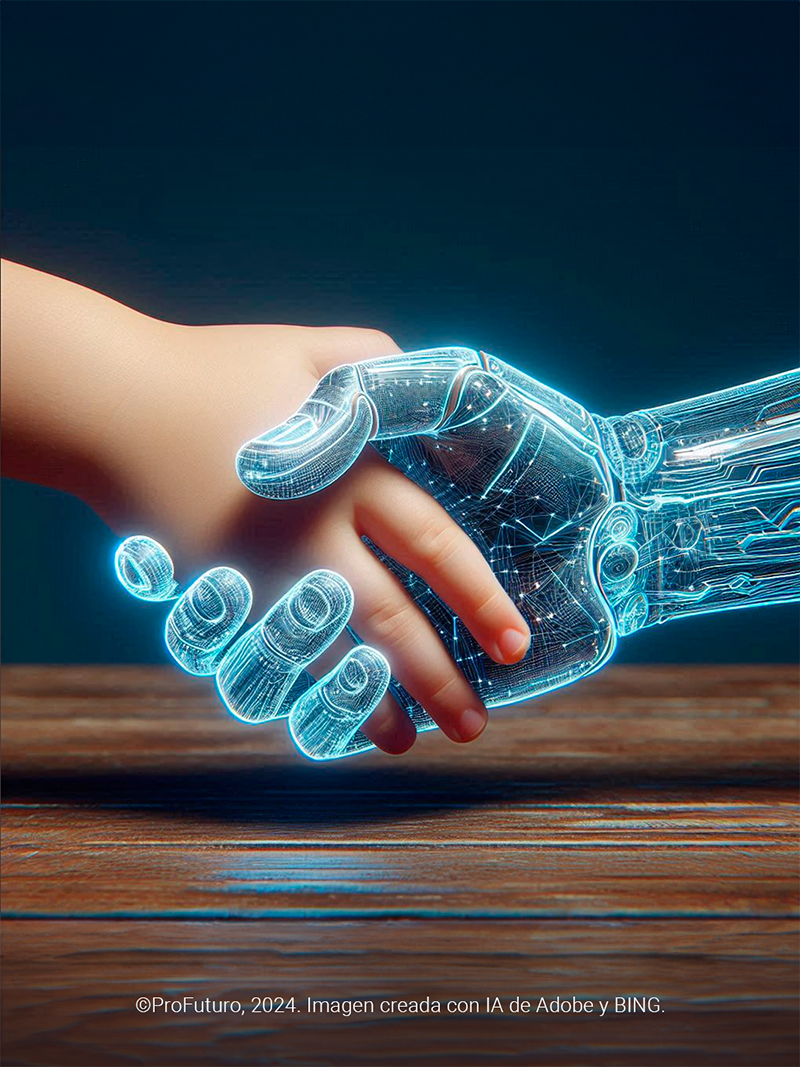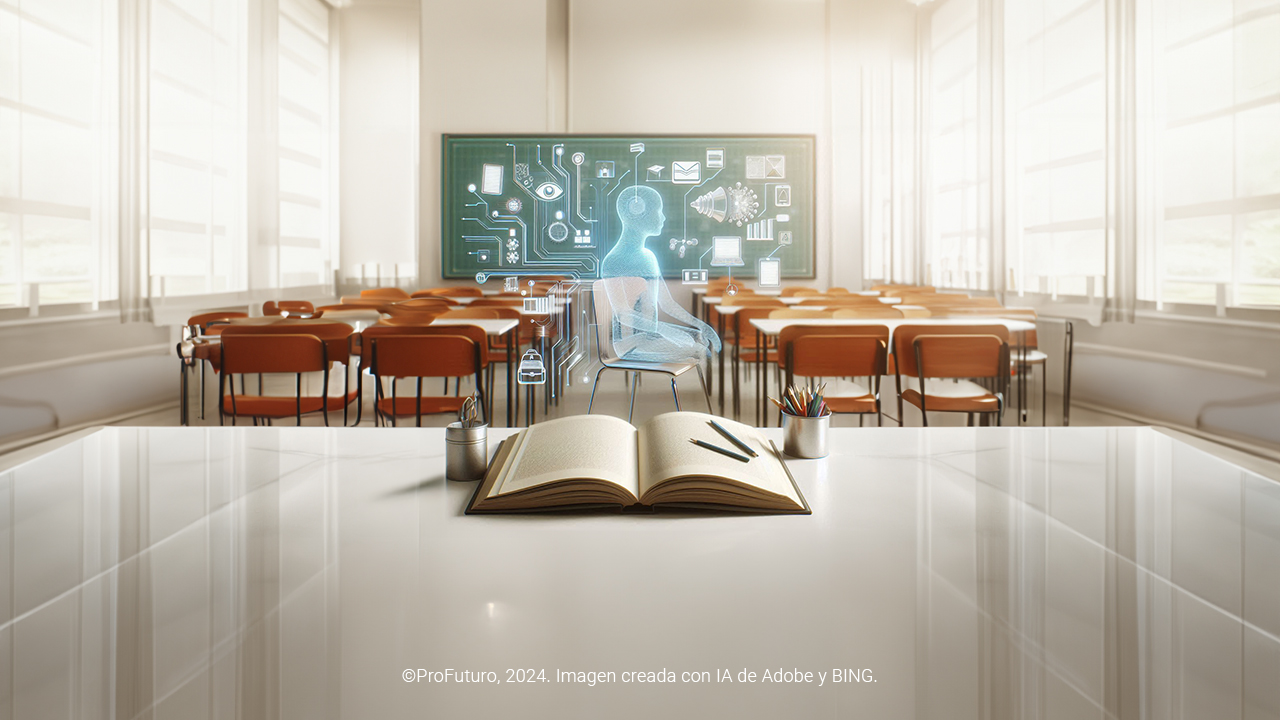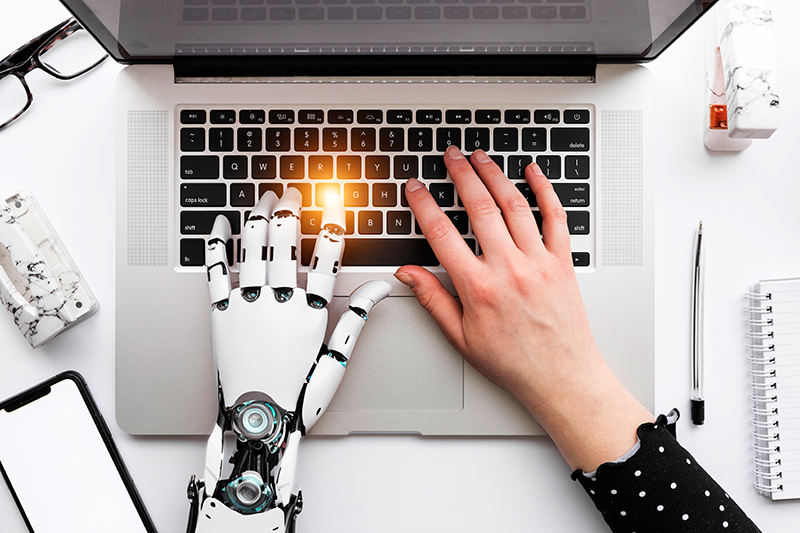Education, in its traditional form, faces one of the most profound challenges in its history: redefining itself in a world driven by technology. In this context, artificial intelligence (AI) emerges as a disruptive element that challenges current paradigms while also offering tools to transform them. The TELOS 2024 Forum invited three key figures from the educational and technological fields—Charles Fadel, Nieves Segovia, and Miguel Costa—who, moderated by Magdalena Brier, general director of the ProFuturo Foundation, debated the impact of AI on education, analyzing its potential as a tool to achieve a more inclusive and humane teaching model.
Redesigning Education for the Age of AI
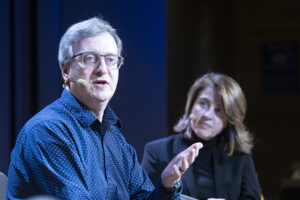
Charles Fadel, founder of the Center for Curriculum Redesign, opened the debate with a clear and provocative vision of how education systems must adapt to the advent of AI. He began by posing a question that rarely receives the attention it deserves: What do we teach, and why? According to him, current education systems remain anchored in a 19th-century model designed to prepare workers for the industrial age. This model, which prioritizes memorization of facts and the acquisition of static skills, falls short of addressing the challenges of the 21st century, marked by rapid and disruptive changes.
The Ability to Adapt and Learn
For Fadel, in a world characterized by volatility, uncertainty, complexity, and ambiguity, the most valuable skills education systems can teach students are lifelong learning and adaptability. In this context, he emphasized the importance of “teaching how to learn.”
“If the world is changing rapidly, the best gift we can give students is teaching them how to learn independently,” he said.
This ability for self-directed learning is crucial not only for adapting to the transformations of the labor market, where today’s jobs might disappear tomorrow, but also for navigating an increasingly complex and technologically advanced society. Fadel argued that by teaching students to think critically, seek knowledge, and adapt to new contexts, they are being equipped with tools that will serve them throughout their lives.
Reassessing Curricular Content
One of the most striking points of his intervention was the need for a radical reform of curricular content. Fadel questioned the relevance of persisting with traditional subjects like trigonometry or certain historical approaches while more contemporary disciplines such as data science, entrepreneurship, programming, or digital ethics remain treated as electives or marginal topics.
“Education must reflect the needs of the present and the future, not the past,” he asserted. Therefore, he proposed a curriculum that integrates technical knowledge to prepare students to handle the most advanced technological and scientific tools; social skills such as communication, collaboration, and empathy, essential in an interconnected world; and ethical values, crucial for making responsible decisions in an environment where technology, including AI, can be used for both good and harm.
This combination, he noted, would not only ensure that students are technically competent but also prepared to face the ethical and social dilemmas of a world driven by AI.
Personalizing Learning and Human Skills
Artificial intelligence has the potential to revolutionize education by personalizing learning in unprecedented ways. According to Fadel, AI can analyze data on students’ performance, interests, and individual needs and adapt content and methodologies to maximize their potential. This allows for more effective teaching that respects the unique pace and capabilities of each student.
However, the founder of the Center for Curriculum Redesign also warned about the limits of technological personalization. While AI can provide valuable tools and data, it cannot replace human interaction, which is fundamental to learning.
“Learning is a deeply social process. Technology can offer data and tools, but the connection between students and teachers is irreplaceable,” he affirmed.
Fadel argued that teachers must continue to play a central role in education, not just as knowledge transmitters but as mentors who inspire, motivate, and guide students in their personal and social development.
“If the world is changing rapidly, the best gift we can give students is teaching them how to learn independently”
Education as a Driver of Humanization
Nieves Segovia, president of the SEK Education Group, brought to the debate a perspective that places people at the center, highlighting the transformative potential of education as a driver of humanization. During her intervention, Segovia reflected on the irreplaceable role of the teacher, the opportunity represented by personalized learning, and the need for a systemic change that ensures technology enriches, rather than dehumanizes, the educational process.
The Power of Technology: Freeing Teachers to Focus on the Human Element
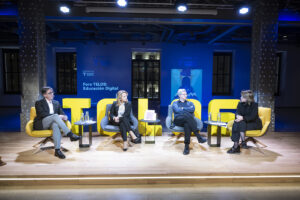
For Segovia, artificial intelligence (AI) should not be seen as a replacement for teachers but as a tool to enhance their work. According to her, the true impact of technology is achieved when it frees teachers from repetitive, administrative, and mechanical tasks, allowing them to focus their time and energy on what truly matters: their connection with students.
“The ideal teacher is not just someone who transmits knowledge but someone who understands their students, connects with them, and knows how to motivate them to develop their best selves,” Segovia stated. This vision redefines the teaching role, in some ways returning it to its origins by situating it as a key figure in the holistic development of students, not only academically but also emotionally and ethically.
The president of SEK emphasized that by automating processes such as grading exams or generating reports, AI can help teachers reclaim their role as mentors and guides. This, in turn, has a direct impact on the quality of education, as it allows teachers to focus on building meaningful relationships with their students, fostering empathy, and cultivating essential skills such as critical thinking and problem-solving.
The Need for a Deep Transformation of the System
Aligned with her humanistic approach, Segovia stressed that AI offers an unprecedented opportunity to personalize learning. This technology enables teachers to adapt content, methodologies, and pedagogical strategies to the specific needs of each student, considering their pace, interests, and learning style. According to Segovia, this level of personalization not only improves academic results but also increases students’ motivation and engagement.
However, she warned that incorporating technology into the current educational system is not enough. “We cannot simply add technology to an obsolete model. A profound transformation of the system is necessary, ensuring that every component aligns with current needs,” she affirmed. This change requires reimagining every aspect of the educational process, from curriculum and assessment to the design of learning spaces and teacher training.
Segovia advocated for a holistic approach in which every component of the system is aligned to respond to the challenges and opportunities of the 21st century. This includes, for example, the need to develop new curricular frameworks that integrate technological skills with human values, as well as the creation of flexible and collaborative learning spaces that reflect the realities of today’s professional and social environments.
Balance Between Technology and Humanity
In her speech, Segovia repeatedly emphasized the importance of maintaining a balance between technology and humanity. For her, artificial intelligence must be a tool to make education more human, not more dehumanized. “Technology must serve us, not dominate us,” she noted, emphasizing that the true purpose of education is not only to prepare students for the workforce but also to help them become well-rounded, responsible, and ethically aware citizens.
She stressed that education has an essential mission: to form individuals capable of contributing to the well-being of society, making informed decisions, and addressing the ethical dilemmas that arise in a world increasingly driven by technology. “Education should not be a means to reproduce inequalities or foster excessive competition, but a space to build bridges, develop critical thinking, and cultivate creativity,” she asserted.
According to the expert, this balance can only be achieved if all actors in the educational system—governments, institutions, teachers, and communities—work together to ensure technology is used ethically and responsibly. This includes educating both students and teachers in the mindful use of technological tools and fostering a culture of continuous learning and collaboration.
The ideal teacher is not just someone who transmits knowledge but someone who understands their students, connects with them, and knows how to motivate them to develop their best selves
Reducing the Digital Divide and Empowering Teachers
Miguel Costa, Director of Institutional Relations at the Empieza por Educar Foundation, brought a practical and equity-centered perspective to the discussion. Costa emphasized the importance of closing the digital divide, strengthening teacher training, and maintaining high expectations for all students, particularly those in vulnerable environments. His perspective highlighted how technology, when used effectively, can be a powerful tool to overcome inequalities and transform lives.
The Digital Divide as a Primary Obstacle
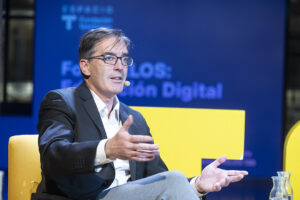 Costa recalled how the COVID-19 pandemic exposed deep inequalities in access to technology. Millions of students, particularly in disadvantaged settings, were excluded from the education system due to a lack of devices, connectivity, or adequate learning spaces at home. This experience revealed an unavoidable reality: educational innovation is impossible without first ensuring that basic needs are met.
Costa recalled how the COVID-19 pandemic exposed deep inequalities in access to technology. Millions of students, particularly in disadvantaged settings, were excluded from the education system due to a lack of devices, connectivity, or adequate learning spaces at home. This experience revealed an unavoidable reality: educational innovation is impossible without first ensuring that basic needs are met.
“We cannot talk about educational innovation if we haven’t first addressed basic needs,” he stated. For Costa, closing the digital divide is a prerequisite for any effort to transform education. This involves ensuring that all students have access not only to devices and internet connectivity but also to an environment conducive to learning, with safe and well-equipped spaces.
Costa highlighted that many administrations and organizations responded swiftly during the pandemic by providing devices and resources to the most affected students. However, he insisted that these measures must become structural and sustainable policies. “Equity in access to technology cannot be a temporary solution; it must be a permanent pillar of education systems,” he added.
Teacher Training in Digital Competencies
Another key point in Costa’s intervention was teacher training. Ensuring access to technology is not enough; it is also crucial to train teachers to fully utilize these tools in their pedagogical practices. He emphasized that teacher training should go beyond the technical use of technology and focus on its effective integration into the classroom. This includes understanding the capabilities and limitations of artificial intelligence (AI) and developing strategies to create meaningful and engaging learning experiences.
“Teachers should not only learn to use technological tools but also use them in ways that motivate students and foster deep learning,” he noted. This requires a focus on innovative methodologies, such as project-based learning, the use of digital simulations, and personalized learning through AI tools.
Furthermore, teacher training must be continuous and adaptive. “Technology evolves rapidly, and teachers need to be in constant learning to keep up with new tools and approaches,” he stated. He also highlighted the importance of creating collaborative networks among teachers, where they can share best practices, resources, and experiences.
“When We Combine Technology, Teacher Training, and High Expectations, Miracles Happen”
One of the most inspiring points in Costa’s intervention was his insistence on the need to maintain high expectations for all students, regardless of their socioeconomic context. According to him, one of the biggest mistakes in vulnerable environments is underestimating students’ potential and adopting less demanding pedagogical approaches. Costa argued that with the right tools and a belief in their capabilities, students in challenging contexts can achieve extraordinary results.
“When we combine technology, teacher training, and high expectations, miracles happen,” Costa stated, citing examples of schools in disadvantaged environments that have successfully implemented innovative projects. Among these, he highlighted initiatives that integrate advanced technologies, such as programming, robotics, and 3D printing, into classrooms. These projects have not only improved students’ academic performance but also sparked their interest in areas such as science, technology, engineering, and mathematics (STEM).
“Equity in access to technology cannot be a temporary solution; it must be a permanent pillar of education systems”
Toward a More Inclusive and Humane Education
The TELOS Forum concluded with an optimistic message: artificial intelligence is not a threat but an opportunity to transform education into a more inclusive, personalized, and humane process. However, the panelists agreed that the success of this transformation depends on the commitment of all stakeholders: governments, educational institutions, teachers, students, and communities.
“AI will not solve the problems of education on its own, but it can be a powerful tool if used responsibly and with vision,” concluded Segovia. Fadel added, “The education of the future is not just about learning technical skills but about becoming a full and adaptable human being.”
With the right tools and collective commitment, artificial intelligence can become a catalyst for an education system that not only prepares students for the future but also contributes to building a more just, equitable, and humane society.



